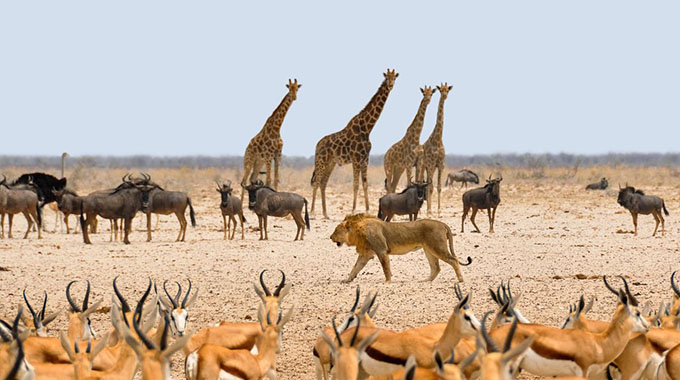
Paidamoyo Chipunza, Senior Reporter
Zimbabwe will be able to take enforcement of wildlife conservation to new levels after the launch on Sunday of an academic forum supported by China that seeks to enhance wildlife conservation.
The forum is called the “Collaborative Research in Agriculture Planning, Ecosystem Security and Wildlife Conservation in Zimbabwe”.
The launch saw the signing of a Memorandum of Agreement and a Memorandum of Understanding by the Sino-Africa Joint Research Centre, Chinese Academy of Sciences and Sino-Zim Wildlife Foundation and Zimbabwe Parks and Wildlife Management Authority.
There was a donation of anti-poaching and research drones, a laptop and projector and enlightening academic research presentations.
The presentations included highlights of the forthcoming research and expected outputs of the collaborative thematic areas in agriculture planning, ecosystem security and wildlife conservation.
In a speech read on his behalf by the Secretary for Environment, Climate, Tourism and Hospitality Industry, Mr Munesu Munodawafa, Minister Mangaliso Ndlovu said the intervention by the Chinese organisations was critical as it forged a new era of intense and robust ecosystem security measures.
The measures included employment of advanced anti-poaching techniques, as evidenced by the deployment of more drones and increased research such as use of remote sensing.
“Thus, the availability and use of drones will ensure early detection, expeditious and timeous reaction to infringements,” said Minister Ndlovu.
“On behalf of the Government of Zimbabwe, I would like to extend our sincere appreciation for the effort exerted by our two partners. We are certain that the existence of this Memorandum of Understanding will reinforce and cement not only relations between and among the three organisations, concerned communities, but also all our conservation partners absent and here present and China and Zimbabwe.”
Minister Ndlovu urged the partners to implement research techniques and tools such as geographic information systems, remote sensing, and spatial monitoring and reporting tool in the thematic areas enshrined in the memorandum of agreement.
“The indicators of their work will no doubt include the publication of papers in high impact journals and reports among other deliverables,” he said.
“In line with the signed Memoranda, I strongly recommend that parties to the memorandum of agreement should, at all times, strive to work within the confines and dictates of the blueprint.”
Sino-Africa Joint Research Centre representative Professor Wang Quingfeng said there was need to adopt a scientific approach to wildlife conservation.
Zimparks director-general Fulton Mangwanya said the intervention was critical in the authority’s drive to ensure that it had staff that was capacitated in terms of education, resources and advanced skills sets.
“To create an eco-system where all elements co-exist in harmony, we need to follow the laws of nature, base our efforts on scientific planning, adopt a holistic approach to conservation, and factor in local conditions,” he said.
“Wildlife conservation may be a long and arduous effort. We must press ahead with a sense of urgency and perseverance to achieve our goals. Last, but not least, we are pleased to join the actions of Zimbabwe wildlife conservation, and feel very grateful to the support and attention from the Chinese Embassy in Zimbabwe and relevant departments of Zimbabwe government.”
